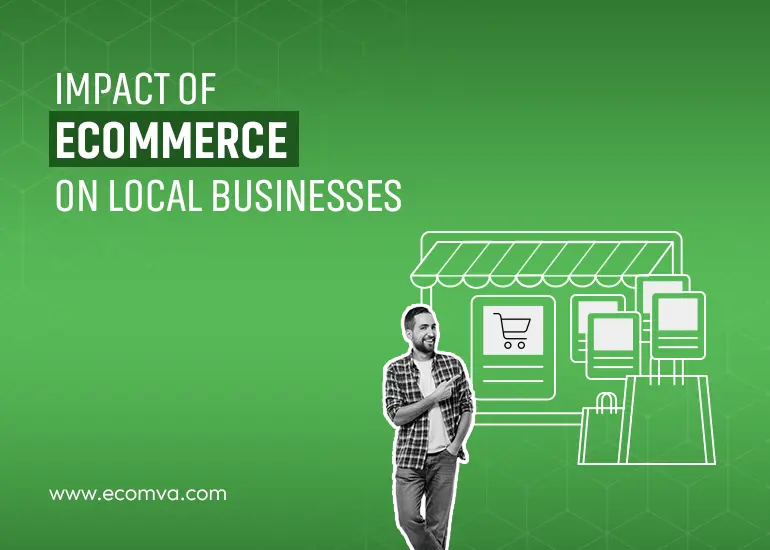A Detailed Guide on the Impact of Ecommerce on Local Businesses

Imagine a bustling Main Street, where small shops line the sidewalks, each with its unique charm and loyal customer base. Now, picture that same street with fewer pedestrians and more “For Lease” signs in shop windows. This stark contrast captures the profound impact of Ecommerce on local businesses. As online shopping grows—projected to reach $6.3 trillion globally by 2024— ecommerce operations local businesses are forced to adapt or risk becoming relics of the past.
But is Ecommerce truly a death sentence for these community staples, or does it offer a new avenue for growth and innovation? In this blog post, we will dive into the dynamic relationship between Ecommerce and local businesses, exploring how they can navigate this digital shift. Let’s dive in:
How Has the Rise of Ecommerce Transformed Local Businesses?
The rapid growth of Ecommerce has reshaped the retail industry in ways that were unimaginable just a decade ago. With consumers now accustomed to the convenience of online shopping, local businesses are feeling the ripple effects. Traditional storefronts, once the cornerstone of community commerce, face dwindling foot traffic as more people opt to shop from the comfort of their homes.
Ecommerce operations have introduced new business models, such as subscription services and direct-to-consumer sales, that challenge the traditional retail setup. This transformation is not just a shift in where people shop but how they shop, what they expect, and how businesses respond.
Comparing the Impact of Ecommerce on Local Businesses Vs. Other Types of Businesses
| Impact Factor | Local Businesses | National/Global Businesses |
|---|---|---|
| Market Reach | Limited to local community; can expand with ecommerce | Extensive, often national or global; enhanced by ecommerce |
| Competition | High competition from larger ecommerce platforms | Competes with other large companies; stronger market presence |
| Customer Loyalty | Strong personal relationships; community ties | Less personal, relies on brand recognition and marketing |
| Cost Structure | Higher per-unit costs due to smaller scale; lower overhead if ecommerce is leveraged | Economies of scale reduce costs; significant investment in infrastructure |
| Logistics | Challenging due to limited resources; shipping can be costly | Well-established logistics networks; efficient distribution |
| Marketing Budget | Limited, often relying on local advertising and word of mouth | Large, with significant investment in digital and traditional marketing |
| Adaptability | May struggle to adapt quickly to ecommerce trends | More resources to invest in digital transformation |
| Brand Awareness | Strong within the local community but limited outside | High brand recognition, supported by extensive marketing |
| Technology Adoption | Slower due to limited resources; may lack advanced ecommerce tools | Advanced ecommerce platforms; continuous innovation |
| Sustainability Practices | More likely to emphasize local sourcing and eco-friendly practices | Varies; larger companies may have more resources to implement wide-reaching sustainability initiatives |
What are the Positive Impacts of Ecommerce on Local Businesses?
Although Ecommerce is a competitive industry with multiple challenges. It has the potential to offer local businesses a range of interesting benefits. Some of these are as follows:
Expanded Market Reach
With Ecommerce, local businesses are able to reach out to customers typically beyond their immediate geographic area. A robust online presence has the potential to attract customers from across the country, or even globally, who may never have found the business otherwise.
Lower Operational Costs
Running an Ecommerce store often involves lower overhead costs when compared to a physical storefront. In this case, you would be able to make considerable savings on rent, utilities, and staffing. The amount you save can be reinvested into boosting your online operations, marketing, or expanding product lines.
Data-Driven Decision Making
Ecommerce operations help you to generate a wealth of data by offering insights into customer preferences as well as buying habits. Thus, this data-driven approach typically lets businesses customize their offerings, enhance customer satisfaction, along with increasing sales.
Flexible Business Models
Ecommerce allows for the exploration of various business models, such as drop-shipping or subscription services, which may be less viable in a traditional retail setting. So, this flexibility can lead to new revenue streams and innovative customer engagement strategies.
What are the Negative Impacts of Ecommerce on Local Businesses?
As already mentioned in the above section, Ecommerce presents several challenges for local businesses. These are as follows:
Increased Competition
Competing with large Ecommerce platforms such as Amazon can be extremely challenging. These giants often get the advantage of scale, which lets them offer lower prices along with faster shipping. So, it can squeeze the profit margins of smaller local businesses.
Loss of Personal Connection
Local businesses generally thrive on personal relationships with their customers, which is considered to be a dynamic that is harder to maintain online. In this case, the lack of face-to-face interaction can lead to diminishing customer loyalty and make it more challenging to build long-term relationships.
Logistics and Fulfillment Challenges
You will find it to be tough and expensive to manage the logistics of shipping as well as returns in Ecommerce operations. Local businesses might even find it to be challenging to meet customer expectations for fast, free shipping without the robust logistics networks that larger organizations possess.
Digital Marketing Demands
Maintaining a robust online presence typically necessities ongoing investment in digital marketing, SEO, and social media. For local businesses with constrained resources, it can be highly challenging to keep up with these demands.
How Can Local Businesses Adapt to the Ecommerce Shift?
It is important for local businesses to adapt to the evolving ecommerce landscape in order to thrive. Here is how they can do it:
Invest in Ecommerce Operations Management
Efficient Ecommerce operations management helps in effectively managing almost every aspect from inventory to customer service. Streamlining these processes can again result in greater efficiency, considerable cost savings, and enhanced customer satisfaction.
Enhance Online Presence
It is highly important to maintain a robust online presence which typically entails a user-friendly website, optimized SEO and active social media profiles. In order to ensure this, you, as a local business owner can consider hiring an Ecommerce assistant or utilizing virtual assistant services to manage these tasks effectively.
Leverage Local SEO
By optimizing for local search queries, you would be able to easily attract nearby customers who are searching for products or services online. Employing keywords such as “buy local” or “shop near me” can drive traffic to their sites and physical stores.
Embrace Omnichannel Retailing
Combining online as well as offline experiences can facilitate creation of a smooth shopping journey for customers. For example, offering online ordering with in-store pickup or hosting events that drive online sales can help in bridging the gap, especially between physical and digital retail.
What Opportunities Does Ecommerce Offer Local Businesses?
Despite the challenges, Ecommerce offers local businesses with multiple opportunities:
Niche Markets
By targeting niche markets that larger competitors might end up overlooking, local businesses are able to carve out a dedicated customer base. It also helps them to thrive in their specific area of expertise. Effective ecommerce store management is crucial in reaching these niche markets and ensuring a seamless customer experience.
Customer Experience Focus
Providing an outstanding customer experience can prove to be a major differentiator. It is possible to achieve this through multiple ways. Some of these include personalized service, high-quality products, or community involvement that resonates with customers and fosters loyalty.
Partnerships and Collaborations
Forming partnerships with other local businesses or influencers can help in expanding your reach. Also, collaborations, which typically entail co-hosted events or joint marketing campaigns can help in attracting new customers. By hiring a virtual assistant, local businesses can efficiently manage these partnerships, ensuring smooth coordination and maximizing the impact of collaborative efforts.
Sustainability and Ethical Practices
Presently, consumers are putting more emphasis on sustainability as well as ethical practices. Local businesses that are involved in prioritizing eco-friendly products and ethical business practices are able to attract customers.
Wrapping Up
Thus, the rise of Ecommerce has undeniably changed the landscape for local businesses, introducing both challenges and opportunities. While the shift towards online shopping presents hurdles like increased competition and logistical complexities. It also opens doors for market expansion, cost savings, and innovative business models.
By embracing Ecommerce business operations management, enhancing their online presence, and focusing on their unique strengths, local businesses can navigate these changes and emerge stronger. The key lies in balancing tradition with innovation, ensuring that local businesses remain integral parts of their communities in an increasingly digital world.










